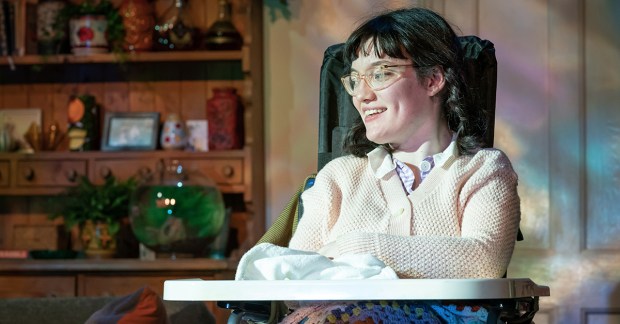Review: A Day in the Death of Joe Egg (Trafalgar Studios)
Simon Evans directs Peter Nichols’ popular play in the West End

© Marc Brenner
A newcomer to A Day in the Death of Joe Egg might be slightly surprised to discover that despite having her name in the title, this is not a play entirely about Joe. She of course is the epicentre around which the other characters operate and organise their lives, but Peter Nichols' play is as much about the family's relationships with one another as with the title character. Originally written in 1967, the story was inspired by the late Nichols' own experiences bringing up a disabled child and the impact this had upon his marriage. Significantly, this production marks the first time in the play's West End history that a disabled actor (Storme Toolis) has been cast in the role of Joe.
Whilst the play's mandate is clearly to make an audience both laugh and cry, it is frustrating that this production is more capable of achieving the former throughout. This criticism is perhaps typified best by Toby Stephens' performance. In his role as Joe's father, he is able to successfully depict the jovial, ironic front that is Bri's rather twisted coping mechanism for dealing with the emotional and psychological stresses associated with raising a disabled child. It is appalling, for example, to watch him joke about smothering his daughter until one realises that for him, this type of sardonic humour remains a "useful anaesthetic". Even during an emotional climax – as Bri runs out on both Joe and his struggling wife – one of his puns is never too far away. Ultimately it is a question of balancing tragedy and hilarity and despite Stephens' comic achievements in the play, it never feels like one that is properly struck.
That is despite the best efforts of Claire Skinner in her role as Sheila, Joe's mother. Skinner is an image of maternal tenderness and defiantly hopeful; unlike Bri, she will never give up on her daughter. The production's closing image of her laying out bricks for Joe to knock down is made all the more pertinent by the fact that Bri has already packed his bags and left, making lies and excuses to his wife on the way out.
The '60s setting is faithfully imagined – those from the decade ought to recognise some of the mini skirts, flares and Cuban heels on show (Peter McKintosh, set and costume design). Given the domestic relationships between the three main characters is where drama ensues, it makes complete sense to set the majority of the action in the family's living room and this is a space that is beautifully rendered. It seems a shame then that for most of the first act, Stephens and Skinner spend a large chunk of time off the mobile set as they come down to the audience and perform a succession of sketches. In truth, they look rather like a pair of lonely stand-up comics.
This feels like a production that has more to say on a sensitive topic but backs out at vital moments. As a character, Bri is symptomatic of a play that is unwilling to truly explore some of the darker fears and thoughts that a parent in his situation might have. The protective comic veil is never truly lifted and that ultimately limits this as a piece of drama.


















